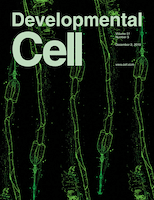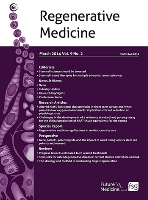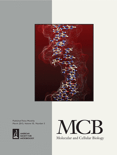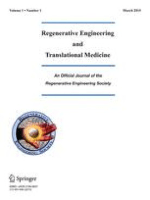
Cell Regeneration
Scope & Guideline
Connecting Researchers to Transform Cellular Understanding
Introduction
Aims and Scopes
- Stem Cell Biology and Regeneration:
The journal extensively covers research related to stem cells, including their differentiation, fate determination, and roles in tissue regeneration across various organisms. - Molecular Mechanisms of Regeneration:
It explores the molecular pathways and cellular interactions that facilitate regeneration, including signaling pathways like Wnt, TGF-β, and BMP, which are crucial for regenerative processes. - Modeling and Engineering in Regenerative Medicine:
The journal emphasizes the development of organoids and in vitro models to study regeneration, providing innovative platforms for drug testing and disease modeling. - Impact of Environmental Factors on Regeneration:
Research on how external factors such as mechanical stress, chemical environments, and cellular niches influence regenerative capacities and stem cell behavior is a core area of focus. - Translational Applications and Therapeutics:
The journal highlights studies that bridge basic research with clinical applications, aiming to develop regenerative therapies for various diseases, including cardiac, neurological, and metabolic disorders.
Trending and Emerging
- Cellular Reprogramming and Induced Pluripotency:
There is a rising interest in cellular reprogramming technologies, particularly in generating specific cell types from pluripotent stem cells for therapeutic applications, as demonstrated by recent studies on cardiac and hematopoietic cells. - Organoid Technology and Applications:
The development and application of organoids for studying human diseases, drug discovery, and regenerative processes is rapidly gaining momentum, highlighting their potential as powerful research tools. - Intercellular Communication in Regeneration:
Emerging research focuses on the signaling pathways and mechanisms of communication between different cell types during regeneration, emphasizing their roles in coordinating regenerative responses. - Impact of Aging on Regenerative Capacity:
Studies examining the effects of aging on stem cell function and tissue regeneration are increasingly prevalent, reflecting a growing recognition of the challenges posed by aging in regenerative medicine. - Therapeutic Strategies Targeting Inflammation and Immune Modulation:
There is an emerging trend towards exploring the roles of inflammation and immune responses in regeneration, with studies investigating therapeutic strategies to enhance regenerative outcomes through immune modulation.
Declining or Waning
- Traditional Models of Regeneration:
Research utilizing classical model organisms for studying regeneration has become less prominent, as newer technologies and models such as organoids and CRISPR/Cas9 gene editing gain traction. - Single-Cell Analysis in Non-Stem Cell Contexts:
While single-cell transcriptomics remains a hot topic, its application in contexts outside stem cell research has diminished, suggesting a more focused interest in stem cell-specific inquiries. - Static In Vitro Cultures:
There is a noticeable decline in studies relying on traditional static in vitro culture systems for regeneration research, as dynamic and more physiologically relevant models are increasingly preferred. - Basic Mechanistic Studies:
Research that solely emphasizes basic mechanistic insights without translational implications appears to be waning, as there is a growing demand for studies that connect basic science with clinical outcomes.
Similar Journals

CELLULAR AND MOLECULAR LIFE SCIENCES
Empowering Global Collaboration in Life Sciences ResearchCELLULAR AND MOLECULAR LIFE SCIENCES, published by SPRINGER BASEL AG, stands as a premier journal dedicated to advancing the field of cellular and molecular biology. With an impressive 2023 impact factor reflected in its Q1 rankings across key categories—including Cell Biology, Molecular Biology, and Pharmacology—it serves as a critical platform for researchers aiming to disseminate high-quality findings in these dynamic fields. Operated under an open access framework, the journal allows broader accessibility to groundbreaking research, fostering collaboration amongst scientists globally. Based in Switzerland, CELLULAR AND MOLECULAR LIFE SCIENCES has been at the forefront of scientific publishing since 1952, adapting to contemporary scientific challenges and trends, ultimately shaping the future of life sciences.

DEVELOPMENTAL CELL
Advancing Knowledge in Developmental BiologyDEVELOPMENTAL CELL, published by CELL PRESS, stands as a premier journal in the fields of Biochemistry, Genetics and Molecular Biology, Cell Biology, and Developmental Biology. With a significant influence evidenced by its Q1 rankings across several categories in 2023 and a remarkable Scopus ranking placing it at the 98th percentile for Developmental Biology, this journal is pivotal for researchers and academics aiming to advance their understanding of cellular processes. Covering a broad range of topics from molecular mechanisms to cellular developmental pathways, DEVELOPMENTAL CELL publishes cutting-edge research articles that contribute to the dynamic landscape of cell biology and related disciplines. Although it does not currently offer open access, the journal is accessible through institutional subscriptions, reinforcing its commitment to disseminating high-quality scientific knowledge produced by leading experts in the field. Based in the United States, DEVELOPMENTAL CELL continues to push the boundaries of discovery and innovation in life sciences, making it an essential resource for professionals, researchers, and students alike in the quest for foundational biological insights.

npj Regenerative Medicine
Shaping the Future of Therapeutic Advancements.npj Regenerative Medicine, published by NATURE PORTFOLIO, is at the forefront of research and innovation in the field of regenerative medicine, fostering a deep understanding of cellular and molecular processes that can be leveraged for therapeutic advancements. Launched as an Open Access journal since 2016, it ensures wide dissemination of knowledge, allowing researchers, professionals, and students to access high-quality articles without barriers. With an impressive impact, it holds Q1 ratings across multiple categories including Biomedical Engineering, Cell Biology, Developmental Biology, and Medicine (miscellaneous) as of 2023, indicating its critical role in shaping contemporary scientific discourse. The journal ranks notably within the top 10% in multiple Scopus categories, indicating its commitment to publishing pioneering research that addresses pressing challenges in regenerative therapies. Addressing the dynamic convergence of disciplines, npj Regenerative Medicine is poised to not only impact academic thought but also translate into clinical applications, making it a pivotal resource for those invested in the future of medicine.

Regenerative Medicine
Empowering Research in Healing and RestorationRegenerative Medicine, published by Taylor & Francis Ltd, is a pivotal journal within the field of biomedical research, focusing on the innovative advances in regenerative and restored functions in human health. With an ISSN of 1746-0751 and an E-ISSN of 1746-076X, this esteemed journal boasts a commendable impact factor within its categories, notably holding the Q2 status in Embryology and Q3 in Biomedical Engineering as of 2023. Covering a broad spectrum of topics from stem cell research to tissue engineering, it serves as a crucial platform for interdisciplinary collaboration among researchers, professionals, and students dedicated to the regeneration of tissues and organs. Given its comprehensive scope from 2006 to 2024, the journal continues to attract high-quality manuscripts that advance the frontiers of knowledge in regenerative medicine. Researchers and practitioners alike are encouraged to engage with the latest findings and methodologies disseminated in this vital publication.

Cells & Development
Exploring the Dynamics of Growth and DifferentiationCells & Development is a premier journal published by Elsevier, dedicated to advancing the field of Developmental Biology. With an ISSN of 2667-2901 and an impressive Q2 ranking in its category for 2023, the journal endeavors to provide a platform for high-quality research articles that explore cellular mechanisms, developmental processes, and molecular interactions that underpin growth and differentiation. Based in the Netherlands, Cells & Development not only emphasizes the importance of innovative experimental approaches but also encourages interdisciplinary contributions that bridge the gap between basic and applied science. As an Open Access publication, it ensures that research findings are readily accessible to a global audience, significantly enhancing visibility and impact. The journal's commitment to scholarly excellence makes it an essential resource for researchers, professionals, and students aiming to contribute to the dynamic field of developmental biology.

JOURNAL OF CELL SCIENCE
Elevating research to new heights in cell biology.JOURNAL OF CELL SCIENCE, with ISSN 0021-9533 and E-ISSN 1477-9137, is a distinguished publication in the field of Cell Biology, released by COMPANY BIOLOGISTS LTD in the United Kingdom. Since its inception in 1966, this journal has served as a vital platform for disseminating cutting-edge research and reviews that significantly advance our understanding of cellular processes and innovations. Currently positioned in the Q1 category within the 2023 rankings, this journal is recognized for its high impact and quality, holding a notable Scopus rank of 120 out of 285 in the Cell Biology category, placing it within the 58th percentile. While not an open-access journal, it provides extensive access options for readers and institutions, ensuring that pivotal research is accessible to a wide audience. With converged publication years leading toward 2024, JOURNAL OF CELL SCIENCE continues to be an essential resource for researchers, professionals, and students alike, fostering a deeper understanding of the intricate workings of cell biology.

CYTOTECHNOLOGY
Fostering Collaboration: Uniting Experts in the Pursuit of Cytotechnology Excellence.CYTOTECHNOLOGY, an esteemed journal published by Springer, stands as a vital resource in the fields of Bioengineering, Biomedical Engineering, and Biotechnology. With an impact factor reflective of its solid position within academia, this journal encompasses a broad scope dedicated to the advancement of cytotechnological research and applications from its inception in 1987 through to its latest volumes in 2024. Based in the Netherlands, it is committed to providing researchers, professionals, and students with high-quality, peer-reviewed articles that contribute to the understanding and innovations in cytotechnology. Although currently not open access, CYTOTECHNOLOGY has garnered a commendable reputation, holding Q3 rankings in multiple categories, indicating its relevance and influence within the scientific community. Researchers are encouraged to submit their cutting-edge findings to share insights that can spark further advancements in this dynamic field.

Cell Journal
Empowering Researchers with Open Access to DiscoveryCell Journal is a leading interdisciplinary publication in the fields of Cell Biology, Developmental Biology, Molecular Biology, and Reproductive Medicine, published by ROYAN INST since its inception as an open-access journal in 2007. With an ISSN of 2228-5806 for print and 2228-5814 for electronic editions, it provides a vital platform for researchers and professionals to disseminate innovative findings and insights that shape our understanding of cellular processes and reproductive sciences. The journal boasts an impressive Scopus ranking, achieving a Q3 position in both Molecular Biology and Reproductive Medicine, highlighting its significance in the academic community. Situated in Tehran, Iran, Cell Journal encourages global collaboration through its accessible content, making cutting-edge research available to a diverse audience. As it converges from 2011 to 2024, the journal continues to emphasize the importance of thorough scientific inquiry, fostering advancements that drive both theoretical frameworks and practical applications in cell science.

MOLECULAR AND CELLULAR BIOLOGY
Exploring the Depths of Molecular ComplexityMOLECULAR AND CELLULAR BIOLOGY, published by TAYLOR & FRANCIS INC, stands as a preeminent platform for researchers, professionals, and students engaged in the dynamic field of molecular and cellular biology. Established in 1981 and ongoing into 2024, the journal features cutting-edge research that spans across vital sub-disciplines, garnering a strong impact in its contributions to the scientific community. With an impressive Q2 ranking in Cell Biology and Q1 ranking in Molecular Biology for 2023, it consistently publishes high-quality articles that reflect the latest advancements and discoveries within the field. The journal is particularly well-regarded for its rigorous peer-review process and commitment to scientific excellence, making it an invaluable resource for those seeking to deepen their understanding of molecular mechanisms and cellular processes. Although not open access, the journal offers diverse access options for researchers to reach the latest findings. By maintaining a strong focus on biochemistry, genetics, and molecular biology, MOLECULAR AND CELLULAR BIOLOGY remains essential reading for anyone looking to contribute to or stay informed about significant developments within this pivotal area of study.

Regenerative Engineering and Translational Medicine
Bridging Science and Application in HealingRegenerative Engineering and Translational Medicine is an esteemed academic journal published by Springer Heidelberg, focusing on the interdisciplinary fields of biomaterials, biomedical engineering, and cell biology. With an ISSN of 2364-4133 and an E-ISSN of 2364-4141, the journal has carved a niche for itself since its inception in 2015, showcasing cutting-edge research that bridges the gap between scientific findings and practical applications in regenerative medicine. As a recognized platform in its field, it is currently positioned within Q3 quartiles in biomaterials, biomedical engineering, and medicine (miscellaneous), with a Scopus ranking that reflects its growing influence among peers. The journal aims to disseminate high-quality, peer-reviewed articles that highlight advancements in regenerative engineering, further advancing both theoretical and applied research. Scholars and practitioners seeking to stay at the forefront of the ever-evolving landscape of regenerative health solutions will find invaluable insights and innovations within these pages. Join a community of leading thinkers and explore the journal's comprehensive research contributions, which are crucial for fostering partnerships between academia and industry in the quest for transformative medical solutions.